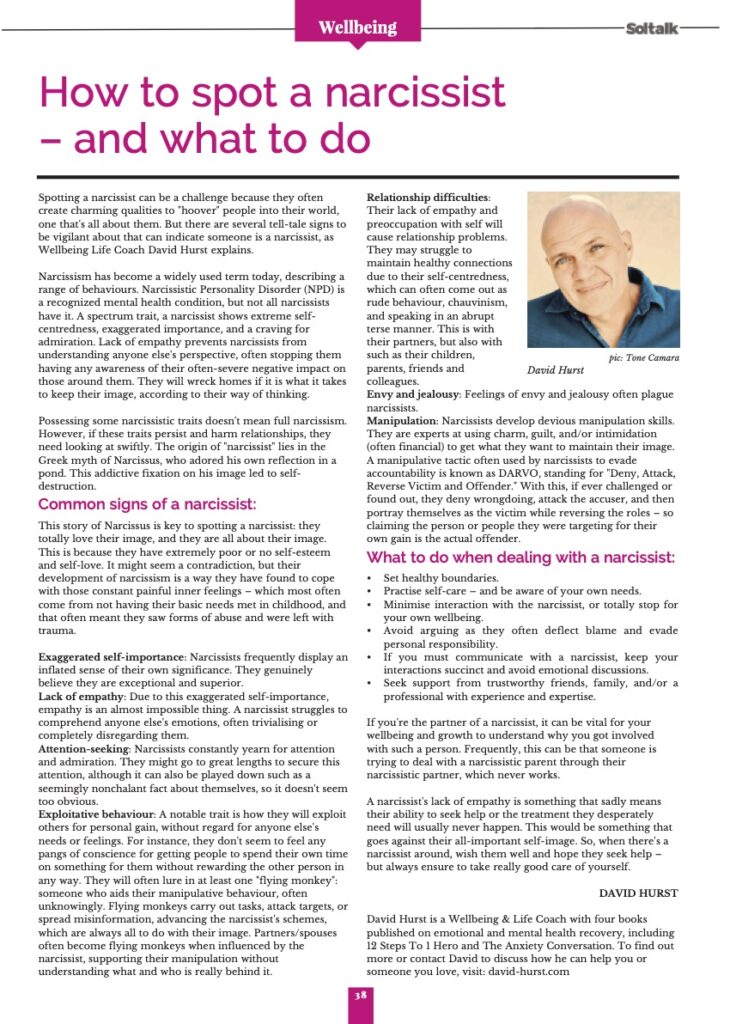How to spot a narcissist

Spotting a narcissist can be a challenge because they often create charming qualities to “hoover” people in to their world, one that’s all about them. But there are several telltale signs to be vigilant about that can indicate someone is a narcissist.
Narcissism has become a widely used term today, describing a range of behaviours. Narcissistic Personality Disorder (NPD) is a recognized mental health condition, but not all narcissists have it. A spectrum trait, a narcissist shows extreme self-centredness, exaggerated importance, and a craving for admiration.
Lack of empathy prevents narcissists from understanding anyone else’s perspective, often stopping them having any awareness of their often severe negative impact on those around them. They will wreck homes if it is what it takes to keep their image, according to their way of thinking.
Possessing some narcissistic traits doesn’t mean full narcissism. However, if these traits persist and harm relationships, they need looking at swiftly. The origin of “narcissist” lies in the Greek myth of Narcissus, who adored his own reflection in a pond. This addictive fixation on his image led to self-destruction.
Common Signs of a Narcissist:
This story of Narcissus is key to spotting a narcissist: they totally love their image, and they are all about their image. This is because they have extremely poor or no self-esteem and self-love. It might seem a contradiction, but their development of narcissism is a way they have found to cope with those often overwhelming painful inner feelings – which most often come from not having their basic needs met in childhood, and that often meant they saw forms of abuse and were left with trauma.
Exaggerated self-importance: Narcissists frequently display an inflated sense of their own significance. They genuinely believe they are exceptional and superior.
Lack of empathy: Due to this exaggerated self-Importance, empathy is an almost impossible thing. A narcissist struggles to comprehend anyone else’s emotions, often trivialising or completely disregarding them.
Attention-seeking: Narcissists constantly yearn for attention and admiration. They might go to great lengths to secure this attention, although it can also be played down such as a seemingly nonchalant fact about themselves, so it doesn’t seem too obvious.
Exploitative behaviour: A notable trait is how they will exploit others for personal gain, without regard for anyone else’s needs or feelings. For instance, they don’t seem to feel any pangs of conscience for getting people to spend their own time on something for them without rewarding the other person in any way. They will often lure in at least one “flying monkey”: someone who aids their manipulative behaviour, often unknowingly. Flying monkeys carry out tasks, attack targets, or spread misinformation, advancing the narcissist’s schemes, which are always all to do with their image. Partners/spouses often become flying monkeys when influenced by the narcissist, supporting their manipulation without understanding what and who is really behind it.
Relationship difficulties: Their lack of empathy and preoccupation with self will cause relationship problems. They may struggle to maintain healthy connections due to their self-centredness, which can often come out as rude behaviour, chauvinism, and speaking in an abrupt terse manner. This is with their partners, but also with such as their children, parents, friends and colleagues.
Envy and jealousy: Feelings of envy and jealousy often plague narcissists.
Manipulation: Narcissists develop devious manipulation skills. They are experts at using charm, guilt, and/or intimidation (often financial) to get what they want to maintain their image. A manipulative tactic often used by narcissists to evade accountability is known as DARVO, standing for “Deny, Attack, Reverse Victim and Offender.” With this, if ever challenged or found out, they deny wrongdoing, attack the accuser, and then portray themselves as the victim while reversing the roles – so claiming the person or people they were targeting for their own gain is the actual offender.
What to Do When Dealing with a Narcissist:
- Set healthy boundaries.
- Practise self-care – and be aware of your own needs.
- Minimise interaction with the narcissist, or totally stop for your own wellbeing.
- Avoid arguing as they often deflect blame and evade personal responsibility.
- If you must communicate with a narcissist, keep your interactions succinct and avoid emotional discussions.
- Seek support from trustworthy friends, family, and/or a professional with experience and expertise.
If you’re the partner of a narcissist, it can be vital for your wellbeing and growth to understand why you got involved with such a person. Frequently, this can be that someone is trying to deal with a narcissistic parent through their narcissistic partner, which never works.
A narcissist’s lack of empathy is something that sadly means their ability to seek help or the treatment they desperately need will usually never happen. This would be something that goes against their all-important self-image. So, when there’s a narcissist around, wish them well and hope they seek help – but always ensure to take really good care of yourself.

My new article for Soltalk magazine.
